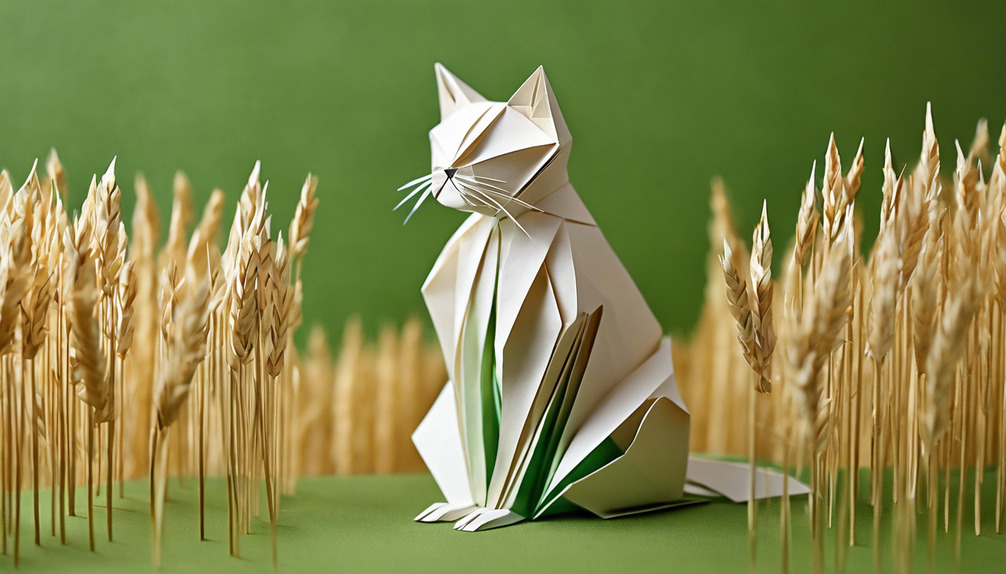As your beloved cat gracefully ages, you want to provide the best care possible to ensure their golden years are filled with comfort and vitality.
You may have come across the debate over grain-free food for aging cats and wondered if it’s truly worth considering.
The decision of what to feed your aging cat is an important one, and the choice of grain-free food holds significant implications for their health and well-being.
But before you make up your mind, there are crucial factors to consider that might just sway your decision in favor of grain-free options.
Key Takeaways
- Grain-free food can benefit aging cats by promoting easier digestion, weight management, improved skin and coat health, support for joint health, and increased energy levels and muscle maintenance.
- When choosing a grain-free diet for aging cats, it is important to opt for high-quality protein sources and ensure essential fatty acids are included.
- Grain allergies are common in older cats, and symptoms can include gastrointestinal issues, skin problems, and respiratory problems. Grain-free food can be a suitable option for cats with grain allergies, and alternative sources of carbohydrates can be included in grain-free diets.
- When selecting a grain-free diet for aging cats, it is crucial to look for a high-quality protein source, choose cat-specific food, consider healthy carbohydrate sources, and ensure the diet meets the unique nutritional needs of cats. Consulting with a veterinarian can provide personalized guidance for transitioning to a grain-free diet.
Benefits of Grain-Free Food for Senior Cats
When caring for your aging cat, you may find that the benefits of grain-free food can significantly contribute to their overall health and well-being. Grain-free cat foods can play a crucial role in ensuring the health of your pet.
These foods are easier for your aging cat to digest, reducing the risk of gastrointestinal discomfort and promoting better overall health. As cats age, maintaining a healthy weight becomes increasingly important. Grain-free diets can assist in weight management, which is crucial for their well-being.
These foods can be beneficial for senior cats with grain sensitivities or allergies, promoting better skin and coat health. Grain-free diets may include ingredients that support joint health, which is particularly beneficial for aging cats experiencing mobility issues.
The higher protein content often found in grain-free food can also help support your cat’s energy levels and muscle maintenance. By choosing grain-free diets, you’re prioritizing the specific health needs of your aging cat and contributing to their overall well-being.
Nutritional Considerations for Aging Cats
As you continue to prioritize the specific health needs of your aging cat, it’s essential to consider the nutritional requirements that can support their overall well-being, particularly focusing on their changing protein, calorie, and essential fatty acid needs.
When it comes to meeting the nutritional needs of your aging cat, there are some important factors to keep in mind:
- Protein Sources: Opt for high-quality protein sources to maintain muscle mass and function in your aging cat. Look for grain-free pet foods with animal-based proteins like chicken, turkey, or fish.
- Essential Nutrients: Ensure that your aging cat’s diet includes essential fatty acids, such as omega-3 and omega-6, to support their joint health and cognitive function. Grain-free cat foods fortified with these essential nutrients can contribute to your cat’s overall health and well-being.
It’s crucial to consult with veterinary nutritionists and dermatologists to understand the specific nutritional needs of your aging cat.
Always remember that the health benefits of grain-free cat foods can be optimized when tailored to meet your cat’s individual nutritional requirements. Don’t hesitate to talk to your veterinarian about the best options for your aging cat’s diet.
Common Grain Allergies in Older Cats
If your older cat is experiencing symptoms like itchiness, excessive grooming, or inflamed skin, it may be due to common grain allergies. Cats can develop allergies to grains such as wheat, corn, and gluten. These allergies can manifest in various ways, including hair loss and sores.
It’s important to be aware of the potential sources of food allergies in cats. While corn is one of the least likely sources of food allergy in cats, other common culprits include beef, dairy, and fish.
When considering the best food options for your aging cat, it’s essential to understand their dietary needs. While grain-free cat food is a good option for cats with grain allergies, it’s also important to note that grain-free diets may not necessarily be low in carbohydrates.
Grain-free cat food often uses alternative sources of carbohydrates like potatoes, sweet potatoes, tapioca, lentils, and peas. Therefore, it’s crucial to consider the specific needs of your older cat and consult with a veterinarian to determine the best diet for them.
Choosing the Right Grain-Free Diet
Considering your aging cat’s dietary needs, selecting the right grain-free diet is essential for their health and well-being. When choosing a grain-free diet for your cat, it’s crucial to consider the following:
- Protein Source: Look for a grain-free cat food that provides a high-quality protein source, such as chicken, turkey, or fish. These protein sources contain essential amino acids that are vital for your cat’s overall health and muscle maintenance.
- Avoid Dog Food: Ensure that the grain-free cat food you select is specifically formulated for cats, as dogs and cats have different dietary requirements. Cat food meets the unique nutritional needs of felines, including taurine, an amino acid essential for heart health.
- Carbohydrate Sources: Opt for grain-free cat food that includes healthy carbohydrate sources, such as sweet potatoes or peas. These alternatives provide energy for your aging cat without relying on whole grains, which can be potential allergens for some cats.
Transitioning to Grain-Free Food for Seniors
When transitioning your senior cat to a grain-free diet, it’s important to be mindful of their unique nutritional requirements and consult with a veterinarian for personalized guidance.
As pet owners, you understand the deep bond and responsibility you have towards your aging cat. Transitioning to grain-free food for seniors can be a thoughtful choice, as it provides higher protein content, serving as an essential energy source for your aging cat. However, it’s crucial to note that not all aging cats require a grain-free diet, but for some, it can offer significant benefits, especially if they’ve specific conditions or sensitivities.
The pet food industry offers a variety of grain-free options, but it’s essential to make informed choices. Ensure that the grain-free food you select aligns with the nutritional needs of your senior cat. If you’re considering homemade cat food, it’s vital to carefully balance the ingredients to meet your cat’s requirements.
Keep in mind that consulting with a veterinarian before making this transition is key, as they can provide expert advice tailored to your cat’s health and potential risks, such as cardiomyopathy (DCM). Your senior cat’s well-being is at the heart of this decision, and with the right guidance, transitioning to grain-free food can support their overall health and vitality.
Frequently Asked Questions
Do Senior Cats Need Grain Free Food?
Yes, senior cats can benefit from grain-free food. It’s easier to digest and can help with age-related sensitivities. Look for high-quality protein and essential nutrients to support your aging cat’s health and vitality.
Why Do Vets Not Like Grain Free Cat Food?
Vets may not favor grain-free cat food because most cats don’t need it for health. They believe grains provide essential nutrients, and cat food allergies are usually related to animal proteins, not grains.
Why Is Grain Free Better for Cats?
Grain-free food can benefit cats by providing essential nutrients and potentially aiding those with sensitivities. Consult your vet to determine if it’s right for your aging cat, ensuring their health and well-being.
How Do I Know if My Cat Needs Grain Free Food?
You can determine if your cat needs grain-free food by observing signs of allergies, digestive issues, or sensitivities. Consult a vet for personalized advice. Remember, every cat is different, and their needs vary.




